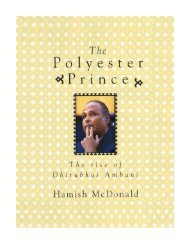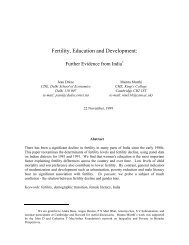Create successful ePaper yourself
Turn your PDF publications into a flip-book with our unique Google optimized e-Paper software.
<strong>The</strong> Pai’s prided themselves on being discoverers and nurturers of talent. A small<br />
museum at Manipal is devoted to the family patriarch T. M. A. Pai (older brother of T<br />
A. Pai) and his teachings. One cherished precept: ’A pygmy nourished well can<br />
become a giant.’<br />
According to K. K. Pai, a family member who eventually became general manager of<br />
the Syndicate Bank. Dhirubhai was introduced to TA. Pai in the mid- 1960s by a<br />
former bank employee named H. P Rao, who was an insurance agent. <strong>The</strong> bank was<br />
interested in developing its foreign exchange activities, and began handling some<br />
transactions for the young spice and textile trader. ‘Our first impression was that he<br />
was very enthusiastic, very enterprising, a man of ideas,’s Pai said. ‘From the<br />
beginning I had the impression he was a go-getter. He was very persuasive, very<br />
convincing in his arguments. He was able to present his case and business proposals<br />
very clearly. He gave me the impression he was reliable and knew what he was<br />
doing.’s <strong>The</strong> Syndicate Bank became the main financier for Reliance Textile<br />
Industries when it started manufacturing soon after, in 1966, providing much of the<br />
Rs 1,5 million needed to buy the first four knitting machines. Another early backer<br />
was the Industrial Credit and Investment Corporation of India (ICICI), whose<br />
chairman Harkisan Das Parekh, another Gujarati, also took a shine to Dhirubhai’s big<br />
schemes.<br />
Dhirubhai continued to impress the Pais by his insistence on the best equipment and<br />
personnel, as well as his knowledge of the market and its trends. He also made<br />
conspicuous donations to the educational institutes run by the family. Throughout<br />
the late 1960s, Dhirubhai kept in close touch with T A. Pai, making sure he was<br />
among the first to call whenever the bank chief visited Bombay from Manipal, and to<br />
give Pai advance notice of ‘any major initiatives. Pai’s nephew Ramdas Pai, who later<br />
became president of the Manipal Academy of Higher Education hears Dhirubhai<br />
coming to Bombay airport in 1968 to greet him on his first trip back from studies in<br />
the United States. T A. Pai in turn promoted Reliance where he could, even to the<br />
point of carrying around samples of its Vimal-brand material in his brief- case to<br />
show others.<br />
<strong>The</strong> bank continued to be the major lending institution for Reliance even after Indira<br />
Gandhi nationalised it and all India other leading banks and insurance firms in July<br />
1969. Although the Pais were unhappy about losing their asset, family members like<br />
K. K. Pai continued to hold the top executive positions for many years. T A. Pai’s<br />
policies of directing credit to small entrepreneurs, agriculturalists and business new<br />
corners which built up a portfolio of very small but sound loans for the bank-were<br />
exactly what Indira had hoped to achieve by the bank nationalisation generally.<br />
Ironically, the government takeover led to the steady bureaucratisation of<br />
management and lending directed by political connections rather than commercial<br />
viability.<br />
This destroyed the soundness of the Syndicate Bank and all the other 20 nationalised<br />
banks. By the end of the 1980s, the banks’ nonperforming assets or bad loans<br />
greatly exceeded their capital base by a wide margin, and but for endless capital<br />
infusions by the treasury almost all would have become insolvent. When private<br />
sector banking was again encouraged, after the 1991 liberalising reforms, the Pai<br />
family took over a small southern-based institution, the Lord Krishna Bank. If offered<br />
the chance to buy back the Syndicate Bank, family members said, they would refuse<br />
it. Immediately after his bank was taken away, Indira consoled T A. Pai by drafting<br />
him to apply his ideas as the first chairman of the nationalised Life Insurance




